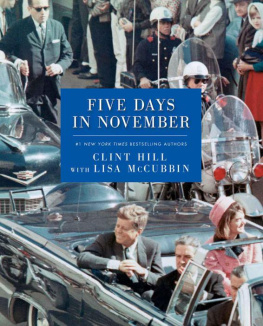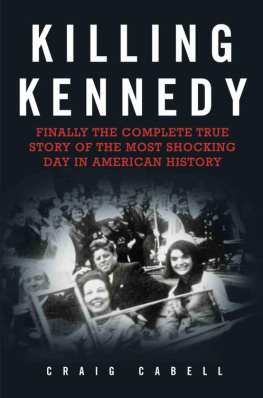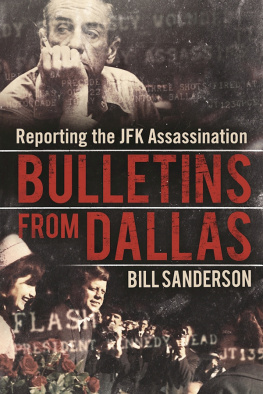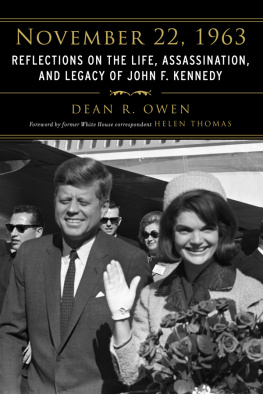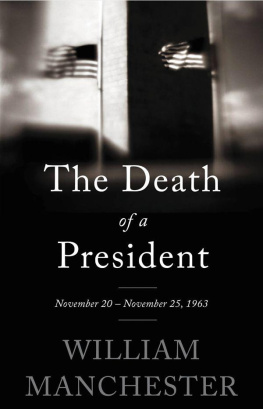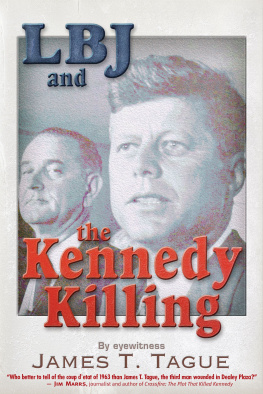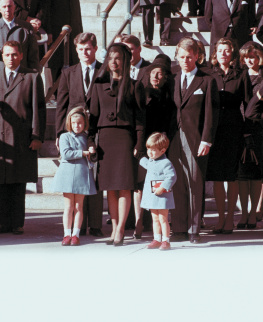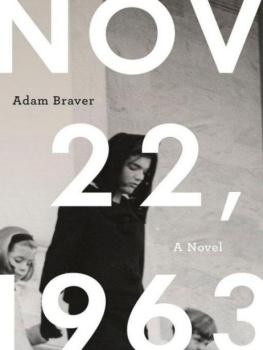ACKNOWLEDGMENTS
W e are grateful to the Sixth Floor Museum at Dealey Plaza for permissions to reprint images and quote from archived KRLD News tapes in their Bob Huffaker and other collectionsand for their dedication to preserving the memory of President John F. Kennedy, the history of his tragic death, and the broader view of his life and U.S. history. These professionals are engaged in outreach to the world, and in particular to its young.
We thank our CBS News colleagues Dan Rather and Bob Schieffer, and PBS stalwart Jim Lehrer for their help and encouragement.
Daniel Irvin Rather, author of Rather Outspoken and managing editor of AXS TVs Dan Rather Reports, has been a friend and colleague since 1961, when he became CBS Southwest Bureau Chief and began his long and distinguished career with that network.
Bob Lloyd Schieffer, who moderates CBSs Face the Nation and lends sanity to Sunday mornings, is unusually qualified for that political hot seat, having covered all four of the major Washington national assignments: the White House, the Pentagon, the U.S. Department of State, and the United States Congress. He has served CBS News in myriad on-air assignments since his first anchor job at Fort Worths WBAP-TV. Before moving to television, he was a reporter for the Fort Worth Star- Telegram, once hauling Marguerite Oswald to Dallas police headquarters after her son shot the president.
We are grateful to James Charles Lehrer, who, as City Editor of the old Dallas Times Herald, put up with Bob Huffaker and Frank Glieber invading his city room to broadcast KRLD radio newscasts daily over a prehistoric olive-drab microphone. Jim Lehrer went ahead to cut the trail for public television news, co-founding what is now the PBS NewsHour with his partner Robert MacNeil, and, from the days of his local public television Newsroom, providing a reliable and determinedly undramatic voice of news to the world for four decades. His fine book Tension City chronicles the history of U.S. televised presidential debates. This soft-spoken ex-Marine moderator deserves special credit for not decking either candidate during his twelfth nationally televised presidential debate: the Obama-Romney spectacle of October 3, 2012, in Denver.
We thank our sturdy floor director Benny Molina, who stayed cool, friendly, and professional through all of our broadcasts, especially those from police headquarters in the uncertain hours and days after JFKs assassination.
We are grateful to writer and reporter Dean Angel and our Dutch film chief, Henk Dewit, who, during the frantic post-assassination days and nights, pushed the 16mm black-and-white through the big developers faster than normal limits just to get it on the air quickersometimes still a little damp and often streaked with developing soup. Gentle-spoken Dean and placidly fierce Henk were a good team. Dean had done his time in the U.S. Air Force, and Henk had done his in a Nazi work camp. Neither of them would have been distracted by the Devil himself.
We are glad that reporter Dick Wheeler joined KRLD News just in time to land in the midst of this peculiar historic story. He became news director of KRLD radio and then had the sense to sail away and live on his sailboat for some idyllic days.
We thank our departed KRLD colleagues: wise news director Eddie Barker; assistant news director Jim Underwood, a Marine veteran of Guadalcanal who ran toward the shots in Dealey Plaza; cool-headed cameramen Jim English and Gene Pasczalek; assignments editor Joe Dave Scott; Fort Worth correspondent Steve Pieringer; reporter and anchor Warren Fulks; versatile Frank Glieber; director Leigh Webb; film chief Henk Dewit; towering engineer Howard Chamberlain, Bill Mercers bodyguard in the chaotic police headquarters; and engineer Otto Nilson, an old shipboard radio operator who knew the stars.
We are grateful to, and for, the talented Janet Harris and Veva Vonler, whose editorial wisdom guided this book, and Kay Banning for her detailed and scholarly index.
Among our competitors who covered this dark story, we are grateful to Bert Shipp, author of Details at Ten. Bert was WFAA-TV News, and plenty of fun.
We lift a cup to Hugh Aynesworth, the crew-cut Dallas Morning News aeronautics and space reporter who witnessed the presidents murder in Dealey Plaza, sped to the Texas Theater and covered the arrest of Lee Oswald, then was with us in the police basement when Jack Ruby shot the young assassin to death. Hughs book JFK: Breaking the News puts the facts in perspective.
To Kent Biffle, Dallas Morning News reporter and now author of A Month of Sundays and a great body of fine writing, who was among reporters held inside the Texas School Book Depository while police combed the place just after Oswalds hasty departure.
To Mike Cochran of the Associated Press, author of Texas vs. Davis and Deliver Us from Evil, who carried Oswalds coffin to the grave and is still a fine and prolific writer.
And to the late and beloved Alex Burton, author of Just One Kiss, Baby, for leaving his native Canada to soothe our tears with erudite and indomitable wit that was kind and well aimed.
Bob Huffaker, 2013
1
Covering a President Becomes a Nightmare
BOB HUFFAKER
I was lifting little children from the top of my mobile unit and handing them back to their parents. I saw the president! a little girl said as I took her under the arms and brought her down from the station wagons luggage rack. Her father thanked me as he took her from my hands. In the canyon of towering buildings, the corner of Main and Akard was crowded with Dallasites who had cheered JFK as his motorcade passed. By the thousands they lined Main Street from Harwood to Houston Street. He had a tan, a little boy observed as I set him down beside his mother. Wasnt Jackie pretty? she asked him as they melted into the throng.
I unslung the transistor radio from my shoulder and set it on the seat of the little black Mercury Cometthe odd unmarked wagon among our fleet of Pontiac Catalinas emblazoned with KRLD News in gold leaf beside the distinctive CBS eye. I replaced the two-way mike on its dash-board bracket and eased the station wagon through the dissolving crowd, most of them on their way to lunch after glimpsing John F. Kennedy and his radiant wife. With the cars low-band radio, I had broadcast a description of the motorcade passing through the jubilant crowd at the ticker-tape paradethe president golden bronze from his secret Addisons disease, Jackie in hot pink to her pillbox hat, and John and Nellie Connally waving from the jump seats ahead.
The transistor radios earpiece enabled me to hear our big fifty-thousand-watt AM signal and take my cue in our live coverage of the presidents visit. I had listened to my colleagues Frank Glieber and Wes Wise broadcasting from similar setups. Frank narrated Air Force Ones arrival at Love Field. Wes took over as the motorcade traveled Lemmon Avenue, then tossed it back for Franks last broadcast from the airport.
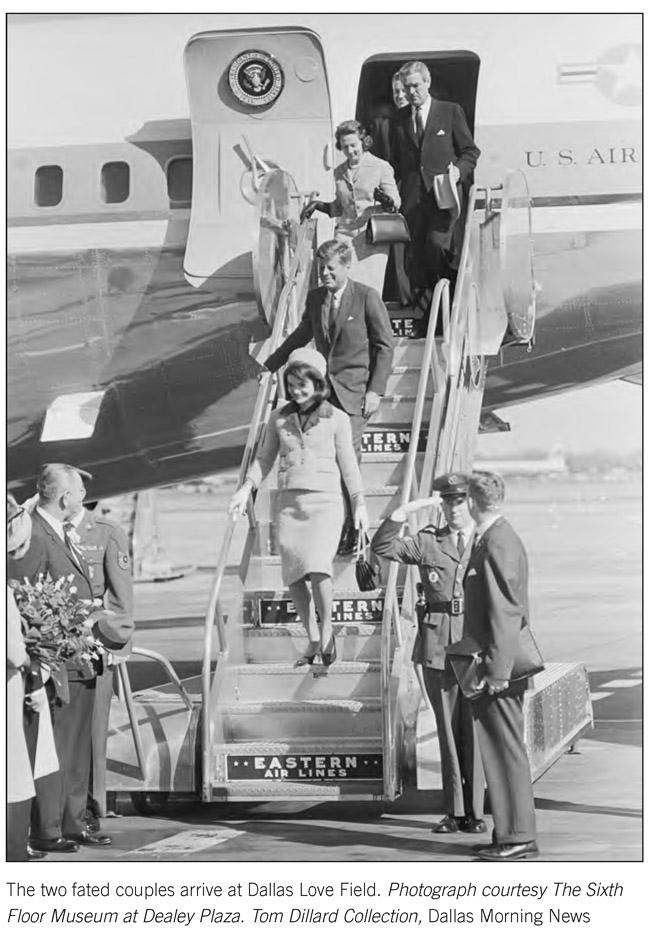
As the motorcade neared the heart of Dallas, Frank introduced me on the air. I took his cue through my transistors earpiece, and as soon as I heard the squelch break when he closed his mike switch, I began to describe the excited thousands lining Main Street behind police lines. Amid festoons of red, white and blue bunting, I described the scene as the parade passed in a whirl of ticker tape. After it had faded from sight, I talked about the presidents political reasons for the Texas visit: to heal enmity between Lyndon Johnsons conservative wing of the Texas Democrats and the partys moribund populist faction led by the states U.S. Senator Ralph Yarborough.


